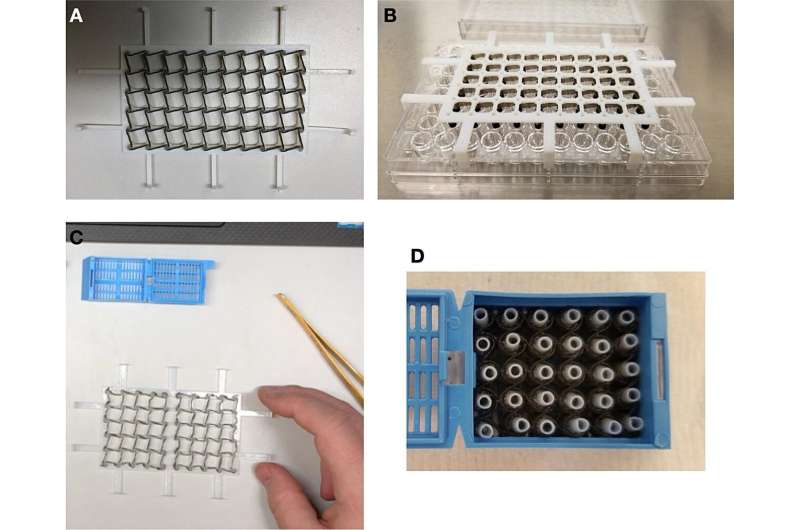Collapsible basket technology aims to improve drug discovery, personalized medicine

A drug discovery scientist typically screens up to 10,000 compounds in the early stages of developing one FDA approved drug. During this high-throughput screening, candidate compounds are initially tested on cell and tissue samples.
Such experiments are conducted using so-called multi-well plates where each of the wells acts as a test tube. Much of the initial screening process is automated—but one big exception is retrieving the cell and tissue samples from multi-well plates, typically 96 or more wells per plate, for further analysis in a microscope for histological analysis.
Now, Purdue University researchers have developed a collapsible basket technology to help speed up the process of retrieving the cell and tissue samples for histology analysis. This will significantly accelerate the analysis process when drug discovery scientists are developing new medicines or when health care professionals are searching for the best drugs for a given patient.
"Our collapsible basket array technology has big advantages for drug discovery and personalized medicine," said Thomas Siegmund, a professor of mechanical engineering in Purdue's College of Engineering. "With our collapsible basket array, cells and tissue now reside in fluid permeable microcontainers submerged in the wells of the plate. Microcontainers are attached to a flexible grid. That grid conforms in size not only to the well plate but also to a much smaller histology cassette where cells and tissue much reside for microscopy analysis."
Siegmund said that with this new device the Purdue researchers not only contribute to a speed-up of process of creating new drugs by removing a time-consuming process step, but also reduce the error rate during tissue and cell transfer.
The Purdue technology is particularly compatible to an emerging technology for cell biology, pharmacology, toxicology and personalized medicines—3-D cell culture, where cells grow in 3-D configuration better mimicking patient tissues. The 3-D cell cultures can give scientists a much more accurate analysis of drug reactions in the body.
"There is increasing scientific interest in 3-D cell cultures derived either from one particular cell type, called spheroids, or from natural and intentional mixtures of multiple cell types, known as organoids," said Bumsoo Han, a Purdue professor of mechanical and biomedical engineering and program leader of the Purdue University Center for Cancer Research.
George Chiu, a Purdue professor of mechanical engineering and member of the team, said, "Our technology is designed to overcome the obstacles with the handling and analysis of 3-D cultures. Those processes are typically laborious, mostly manual and with a low throughput. Increasing throughput can benefit both drug discovery as well as personalized medicine."
The Purdue collapsible basket array is designed to be reconfigurable for high throughput culture and histological analysis, which involves studying the tissue and any associated diseases. Scientists and doctors often use such analyses to study patients with cancer to better examine tumors.




















